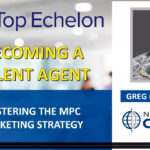I’ll never forget the most miserable hour of my day when I first started in the recruiting business. It was “plan time.”
This dreaded hour was spent handwriting the names and numbers of those people I was going to call, and if I didn’t call them, then I’d have to spend an entire hour the next day handwriting the same names and numbers over and over again. This was before computer databases existed and it was a miserable experience, so I did what any fun-focused recruiter would do: I blew it off. And my production reflected my lack of planning.
But a few years later, when databases became mainstream, I found that I didn’t have to handwrite the names and numbers over and over again. All I had to do was print out the names and numbers of who I was going to call.
I didn’t really have much focus of when I was going to call them and I was supposed to develop some sort of a plan, but I figured that I’d just randomly follow the call list and I did what any overconfident, technology-savvy recruiter would do with planning: I blew it off. And my production reflected my lack of planning.
Finally, I made a decision to hit the next level in production. I was tired of almost achieving my goals and knew that I had to get just a little bit sharper on my desk. The only way I could get better with my placements was to get better with where I spent my time, which is the whole objective of planning.
Follow these seven secrets of planning for recruiters and see how much more you can bill in the next 90 days:
#1—Start each day with a specific focus.
“What are the two or three things I need to accomplish today to be considered successful?” Write those goals down every day and think about them throughout the day.
#2—Review your activity sheet.
Identify those four or five searches that need to be “touched” in the day. Do you have to extend an offer for search assignment A? Do you have to prep and debrief interviews for search assignment B? Do you have to qualify candidates who you recruited yesterday for search assignment C? Do you have to find candidates for search assignment D? Do you have to source names for search assignment E?
Review your activity sheet and make notes each day on what action items need to happen to keep the rhythm of the searches moving forward. Ask yourself this question when you look at each search on your desk: “What is the most important thing that needs to happen with this search, right now?”
#3—Carve out specific blocks of your time for each of those four or five action items.
Thirty minutes of sourcing can give you thirty names if you do it right. Three hours of recruiting can give you coverage of fifteen candidates if you hustle and stay on the phone and keep your initial recruit calls to six minutes or less. Two or three hours of prepping, debriefing, and qualifying can help you bring your candidates forward in the process and give you more information on those who you wish to present to your clients.
An hour blocked out for your client and candidate who are getting ready to bring closure to your deal is enough to close it, but be flexible because this type of call is the most significant of your day and takes priority over all other conversations. And wrap up those calls at the end of the day that are still important and leave at least 30 minutes to an hour to strategically plan where you’re going to spend your time tomorrow.
Each day is different, but this gives you an idea of how you can keep your desk balanced. You can also shake it up by scheduling business development calls with warm prospects and other business-generating activities a few times a week.
#4—Respect the phone time of others.
Would you interrupt a surgeon in the middle of surgery to talk about your weekend? Why do you do that with your colleagues? Are you working on a search together with another recruiter? Then schedule your “connection time” in advance so both of you know when you’re going to talk about it. Set up specific protocols of when it is acceptable to socialize and when it’s not.
This doesn’t institutionalize a cold and formal culture in an organization. In fact, it frees it up to know when it’s time to hustle on the phone and when it’s time to goof off. “Goof off time” is important, but it’s important that you do it when it doesn’t interfere with the core business of building external relationships.
#5—Schedule your own breaks in advance.
Schedule your stretch-breaks and lunches in your plan. Reward yourself once you have completed each blocked group of time.
#6—Hustle throughout the day, especially after a good call.
Did you just close a deal? Then spend the rest of the day involved in business development activities or marketing a candidate. The biggest mistake that recruiters make after they achieve success is that they limit themselves to that one singular success and take the rest of the day off. Success begets success. Leverage it to your advantage to get you to the next level of success that you deserve.
#7—Inspect each other’s plans.
We’re recruiters, for crying out loud. We don’t do anything unless we know someone else will be checking up on us, so at your next team meeting, discuss what your plan for the week is and bring a copy of your plan for today. Show your colleagues how you block out your groups of time and how you assemble your call lists from the database. Make a commitment to each other that for the next 90 days, nobody leaves the office until they have a plan in place for the next day.
To summarize, here are the three components of a solid plan:
- Specific goals of achievement written out: Two or three things that need to be accomplished.
- Blocks of time carved out on a daily calendar, and what you are going to accomplish during those times.
- Printed-out call lists from the database for each of those blocks of time.
Bonus tip: Stay off the Internet during your call time. Use it to plan during your plan time. If you must use it, then schedule 10 minute Internet breaks throughout the day to catch up on phone numbers that you need to find for candidates who have been referred to you. Schedule admin breaks to email candidate resumes to clients or to check your personal email. The tighter your plan is, the more focused you are on your effectiveness of achieving your daily objectives.
— — —
Scott Love, guest writer for the Top Echelon Recruiter Training Blog and owner of The Attorney Search Group, trains, motivates, and inspires recruiters to achieve greatness in the profession. Visit his online recruiter training center for tips, downloads, videos, and articles that can help you increase your recruiter billings.








